Excitement seems to be high for Nintendo’s new handheld, and that’s somewhat understandable. I watched the E3 conference too and came away suitably impressed, as the company seemed to be doing everything right: some nice technical innovation, an impressive list of new and remade games, a portable Virtual Console for Game Boy games – why that couldn’t have been added to the pointless DSi is beyond me, though – and a nail in the coffin for 3D with glasses. Brilliant. I’m in.
Only I’m not. Here’s why.
- Region locking. It’s still only rumoured at this point, admittedly, but it’s what the buzz is suggesting and the fact that the DSi has done it doesn’t bode well. I can deal with it on a home console, although it’s definitely better without, but I find it on a handheld to be completely inexcusable. All previous Nintendo handhelds, as well as the PSP, haven’t done it specifically before people take these things on holiday with them and might want to pick up a game or two. And if I hadn’t done that, I’d have missed one of my favourite games ever. Goodbye to that, then. Now that even region coding on consoles is on the wane, it’s an unacceptable retrograde step.
- Battery life. I own a DS Lite and a DSi, and I honestly regret buying the DSi and tend not to use it. Beyond the size and the region-locking, even in regular DS games without any DSi features, the biggest fault was the battery life. I took both of them on holiday and found myself predominantly using the DS Lite, simply because I could better rely on it to last me through a flight and the time spent sitting around in an airport. And, being out of the country, I could buy games for it without worrying about whether or not they’d work. Funny how that works, isn’t it, Nintendo?
- I love Ocarina of Time, Star Fox 64 and Pilotwings 64. Metal Gear Solid 3 is by far my favourite in the series. Street Fighter IV is a modern classic. And all the usual suspects are here too. But I’m not paying £200 or more just for those. Let’s get some new stuff boasting the creativity that the DS was showing only a few years ago.
- Game Boy bulky with a crappy screen? Game Boy Pocket. GBA screen impossible to make out? GBA SP or, better yet, a Micro. DS looks like an 80s Fisher-Price toy? Hello, DS Lite. 3DS got a horrible battery life? Do you see where this is going?
It’s amazing me, though maybe it shouldn’t, that many of the same people who crucified the PSP back in 2004 for shit battery life and a pile of console ports are now strangely silent, or maybe banging the ‘good enough’ drum. It was pathetic then and it’s still pathetic now. Nintendo is making a lot of the same mistakes that Sony did with the PSP, and it might get away with them because it’s a company on the up as much as Sony was starting to slide back then. I still think it’s sad, though.
I’m a gamer, so at some point I’m going to buy a 3DS. A 3DS Lite will certainly do it and, I admit, Professor Layton vs Ace Attorney could end up breaking me – I adore both of those series and the crossover is a wonderful idea – but I’m not too happy with Nintendo right now. Maybe it knows something we don’t and whatever comes out at the PSP2 announcement will make the 3DS’s battery life look like an age…

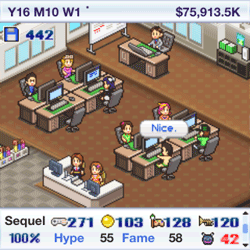 There are tons of films about films, and plenty of music about making music, but a conspicuous lack of games about games. The mark of an immature medium or a lack of mainstream interest in the actual making of games? Probably both, but nobody who’s played it can forget the superb gallows humour of
There are tons of films about films, and plenty of music about making music, but a conspicuous lack of games about games. The mark of an immature medium or a lack of mainstream interest in the actual making of games? Probably both, but nobody who’s played it can forget the superb gallows humour of 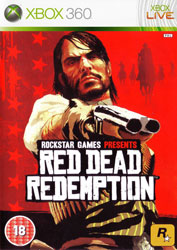 If last generation’s defining games, the Grand Theft Auto series, feels like it’s past its best – a feeling that, I would suggest, is shared by Rockstar, given the reduced prominence of the franchise – what Red Dead Redemption did was prove that the formula itself is still full of life.
If last generation’s defining games, the Grand Theft Auto series, feels like it’s past its best – a feeling that, I would suggest, is shared by Rockstar, given the reduced prominence of the franchise – what Red Dead Redemption did was prove that the formula itself is still full of life.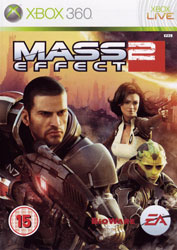 I know for a fact that many of the first game’s most ardent fans will disagree vehemently with this, but for my money Mass Effect 2 will stand as one of the primary examples of how to improve on a game for its sequel. It may have jettisoned some of the RPG ideals of the first game, but I found its attempts at streamlining perfect, creating a brilliant action-RPG – emphasis on the ‘action’ – with one of the best open-ended stories in recent history. The important thing is that what the first game did best – creating a wonderfully vibrant and believable sci-fi universe – was preserved and expanded.
I know for a fact that many of the first game’s most ardent fans will disagree vehemently with this, but for my money Mass Effect 2 will stand as one of the primary examples of how to improve on a game for its sequel. It may have jettisoned some of the RPG ideals of the first game, but I found its attempts at streamlining perfect, creating a brilliant action-RPG – emphasis on the ‘action’ – with one of the best open-ended stories in recent history. The important thing is that what the first game did best – creating a wonderfully vibrant and believable sci-fi universe – was preserved and expanded.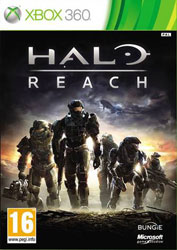 What is likely to be Bungie’s last entry in the series that it grew from niche Mac RTS to one of the biggest FPS franchises in history proved to be a fitting goodbye. It was almost like, freed of fitting another game into the Master Chief’s story and carrying the Xbox brand now that games like Gears of War can share the load, Bungie was able to flex its creative muscles, and while I’ll concede that it’s still super soldiers killing aliens, it was the most fun I’ve had with a game in this series since I first took it online.
What is likely to be Bungie’s last entry in the series that it grew from niche Mac RTS to one of the biggest FPS franchises in history proved to be a fitting goodbye. It was almost like, freed of fitting another game into the Master Chief’s story and carrying the Xbox brand now that games like Gears of War can share the load, Bungie was able to flex its creative muscles, and while I’ll concede that it’s still super soldiers killing aliens, it was the most fun I’ve had with a game in this series since I first took it online.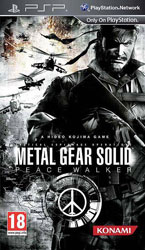 Considering the esteem in which the franchise is held, Metal Gear has a lot of disappointing instalments. This, however, wasn’t one of them, following up the best in the series – that’s MGS3, for those who aren’t keeping count – and absolutely stomping over the letdown of Portable Ops. This was a proper Metal Gear Solid game, originally planned as MGS5, and it’s a strong contender for my favourite of the lot.
Considering the esteem in which the franchise is held, Metal Gear has a lot of disappointing instalments. This, however, wasn’t one of them, following up the best in the series – that’s MGS3, for those who aren’t keeping count – and absolutely stomping over the letdown of Portable Ops. This was a proper Metal Gear Solid game, originally planned as MGS5, and it’s a strong contender for my favourite of the lot.